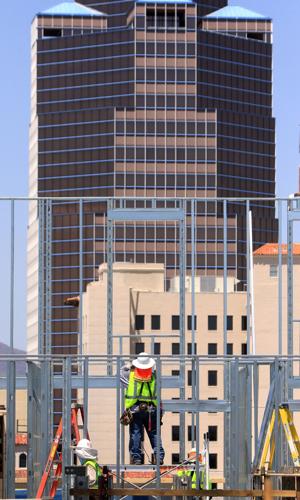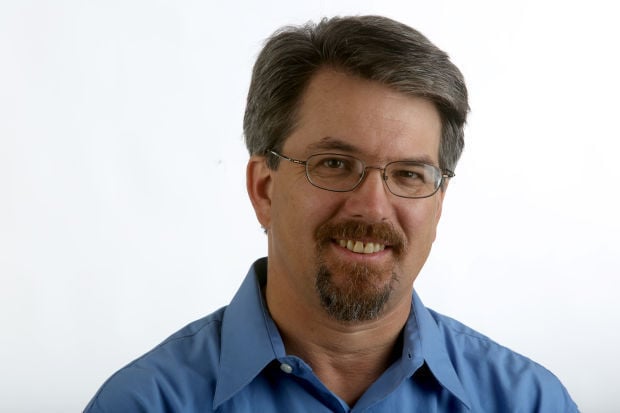Look around yourself, sitting there in your so-called home.
How does hell look?
I ask because, if you’re in the United States, you are in a borderline living hell, according to much of the political rhetoric we’re hearing lately. This close to the border in Southern Arizona? Definitely a hellscape.
That’s the impression Donald Trump left in his speech on illegal immigration Wednesday night in Phoenix, in rhetoric that matched much of the doom and gloom we’ve heard during this never-ending campaign.
“President Obama and Hillary Clinton have engaged in gross dereliction of duty by surrendering the safety of the American people to open borders, and you know it better than anybody right here in Arizona,” he said to the approving shouts of the audience.
Later, he said, “we’re in the middle of a jobs crisis, a border crisis and a terrorism crisis like never before. All energies of the federal government and the legislative process must now be focused on immigration security. That is the only conversation we should be having at this time, immigration security.”
The only conversation — really?
The sense of crisis and doom is essential to Trump’s appeal, as the howls of the crowd made clear — and it is central to much of today’s political rhetoric. However, watching Trump’s speech online Wednesday night in Tucson, Arizona, I had no idea what reality he was talking about.
I’ve spent a lot of time talking with poor people around here — from the homeless camps to our many rundown trailer parks — and still, that rhetoric doesn’t match the reality I’ve seen.
This has been a poor town for years and remains one, but it is definitely, visibly improving. Going downtown on Friday I drove along recently paved streets past four major construction sites on what used to be blacktop parking lots.
Bureau of Labor Statistics data show Tucson’s job growth has been remarkably fast this last year. The number of jobs grew by 4.2 percent from July 2015 to July 2016, economist Jeb Kolko noted. That’s the third fastest of any U.S. city. Better: We’re not talking about unemployment rates, which do not include those who have stopped looking for work, but simple, raw new-job numbers.
Wondering if I am missing something hellish in Tucson’s daily life (other than the heat) I decided to stop by a diner Friday morning to get the opinion of the late breakfasters inside. Since I love cinnamon rolls, I picked Gus Balon’s, 6027 E. 22nd St.
The first customer I asked, Mary McLaughlin, is 74 and a political conservative, eating with her son, Jeff Bales. She said, “I don’t see Tucson as a town that is business-friendly,” and spoke of her opposition to the downtown streetcar and waste in Rio Nuevo. When I asked about national politics, she decried the lies of Hillary Clinton and her actions related to Benghazi.
When I asked her how things are going, she told me about her politics, but I wanted to know how things are going for her. To that she said they were OK, that’s she’s just a churchgoing woman and a quilter. Interesting, I thought.
Next I spoke with Michael and Veronica Heredia, 38 and 37, who were, frankly, pretty darn optimistic.
“Personally, things are wonderful — financially, physically,” Michael said.
He’s been in real estate — buying, selling and managing residential property — for 12 years, he said. After the crash in 2008, he almost lost it, but he hung on and is doing great now.
“Everything’s dramatically getting better,” he said.
He and Veronica are independents, both in the real estate business, and seem to be politically moderate. Veronica had some specific concerns about how government operates — especially about the Department of Child Safety and Tucson Unified School District. She wants improvement in both and agreed when her husband said, “Damn politicians need to figure out how to work together.”
At the last table where I stopped, John and Suzy Shukwit were finishing breakfast and groaned at Donald Trump, whom they consider a fraud.
“Trump’s reality is not my reality,” said Suzy, who is retired from a career in health-care human resources.
When I asked her how life is going in Tucson, Suzy was hesitant. She hates the traffic and worries about crime in their far-east-side neighborhood.
“We’re seeing crime moving closer and closer,” she said.
When I asked whether she knew that from personal experience or neighbors’ experiences, she said no, that it was “from the news.”
The news and politicians. Those, I’ve found, are the two big sources of doom and gloom in what otherwise might be considered a pretty decent time in this city and, generally speaking, in this country.
There are spikes of concern — the killings of police this summer, the far-too-regular mass shootings — that seem to shake our foundations. It would be wrong to ignore them, but we should also keep them in perspective. Acts of spectacular violence are less likely to affect any of us than our familiar, chronic problems: surging drug abuse, persistent joblessness for some, inadequate and expensive education.
And, yes, even border security.
These are tough, intractable problems, and we should demand that our politicians address them. But they don’t make this place a living hell.





